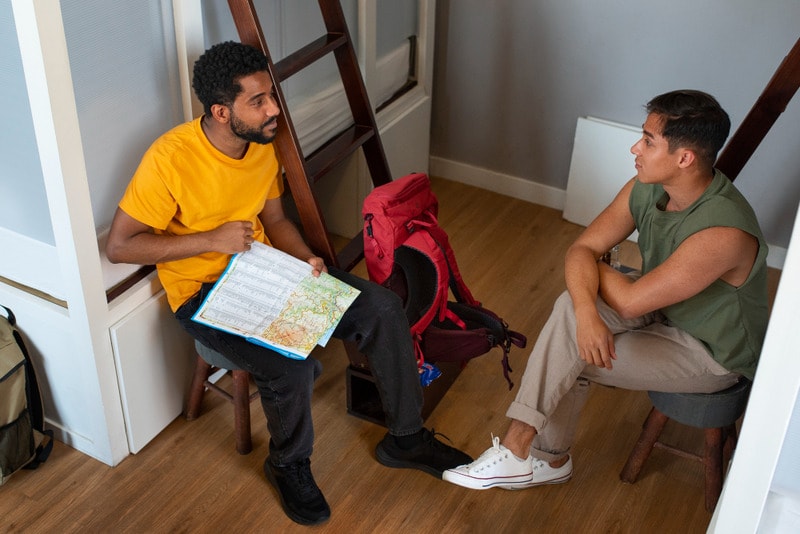The initiation of a new country is similar to beginning an amazing trip. Learning to speak another language, especially English, often accompanies what many new immigrants see as a fresh start. Being able to speak English is essential for feeling comfortable and genuinely experiencing an English-speaking environment. Master the languages (although English is a real must) and get to know your neighbors.

In this article, I will provide you with practical tips for improving your English language skills, starting from scratch and progressing to community-based skill sharpening. You should use these tools immediately to establish yourself and connect with your new community.
Building Connections: Simple English Phrases Every Immigrant Should Know
When you move to a new place, having basic English language skills can work wonders. Simple English phrases are your first step to starting conversations and showing your new neighbors that you’re eager to connect. Even if English is your second language and you’re still learning to speak it, a friendly “hello” can open doors.
Begin with essential phrases like “Hi,” “Good morning,” or “How are you?” These are easy to remember and useful in everyday interactions. Introductions like “My name is [Your Name]” or “Nice to meet you” help break the ice and start building relationships. Courtesies such as “Please,” “Thank you,” and “Excuse me” are always appreciated and help create positive interactions. Break these phrases out when you meet someone new, drop by town shops, or join community events. Naturally, your confidence will increase as you speak English more.

Videos and audio clips are an excellent resource for ESL learners to comprehend how native speakers use these phrases in real-world conversations. Do not worry if you make a mistake; everyone knows that learning a second language in a busy daily life is difficult.
Learning these basic phrases is akin to planting seeds. With some time, these little attempts will become bigger conversations and relationships, allowing you to assimilate more into your new home city and improve your English.
Participating in Community Activities to Improve Your English proficiency
Community activities are great ways to support practicing English, in addition to meeting new people. This opportunity to practice what you’ve learned in Learning English as a Second Language classes in everyday scenarios is crucial for gaining a grasp of the language. And it also helps you know and connect with the pop culture around you.

There are a multitude of ways to get engaged. One of the best possible ways to do this is through volunteering in order to give back as well as have more opportunities for practice. Also, think about joining a local club (book club, sports club, hobby group, etc.). In those activities, students can participate in activities whereby they have a chance to use the English language without pressure.Or maybe local events at a festival, fair, or workshop? These are great opportunities to practice talking and listening. Even if your English is bad, that’s fine; the most important thing is that you are doing and trying. Bottom line: ask, dialogue, speak with another person, and make errors so you can improve.
The more you do these things, the closer your dream of speaking fluently. In no time, you’ll see some familiar faces and begin to feel right at home. You will make friendships that you can rely on during your English language learning experience and as an expatriate in the country.
Overcoming Language Barriers: Resources for Immigrants Learning English
Language barriers can be daunting, but many resources are available to help you improve your English and overcome these obstacles. Whether you’re just starting to learn English or looking to advance your skills, programs like the Adult Migrant English Program can provide the support you need to boost your English proficiency.
Key Resources to Consider:
Online ESL Program:
- Websites and apps offer structured ESL courses that cover everything from grammar to vocabulary, writing skills, and speaking practice.
- Many online English classes for immigrants allow you to learn English at your own pace, making it easier to fit education into your daily life.
Community-Based English Classes:
- Local community centers, libraries, and schools often offer free or low-cost English classes. These programs provide a supportive environment where non-native English speakers can learn alongside others who are also mastering English as a second language.
- Language exchange programs are another excellent option. These programs allow you to practice speaking English with native speakers while helping them learn your language, offering a balanced exchange of language skills.
Tips for Making the Most of These Resources:
Set small, achievable goals:
- Aim to learn a few new words each day.
- Have a short conversation in English regularly to practice speaking skills.
Integrate English into your routine:
- Label household items with their English names.
- Write shopping lists in English.
- Watch English-language TV shows to improve your listening skills.

Keep in mind that making mistakes is part of the second language learning process. The more trips you take, the closer you are to perfecting your handstands in English. Celebrate your progress, no matter how small. Turn to online or local study groups, speak with fellow English class or ESL course takers, and swap tips and stories; this helps keep the morale high.
Conclusion:
The first and foremost point in making a positive impression on your new home is to learn how to engage within the community there, adapt yourself using English, and take other important steps. You will see that the language barrier starts to become invisible just by learning a few English phrases, getting involved in your community activities, and attending available ESL classes.
Do something today by looking for ESL programs near you, joining a group, reading more materials in English, or practicing with friends. You spend your time learning English and building relationships, which will improve your quality of life every day—from getting a fancy job to having delightful people around.

Learning to speak English well is a journey. It may have challenges, but with persistence and the right support, you’ll achieve fluency and fully embrace your new life in an English-speaking country.



